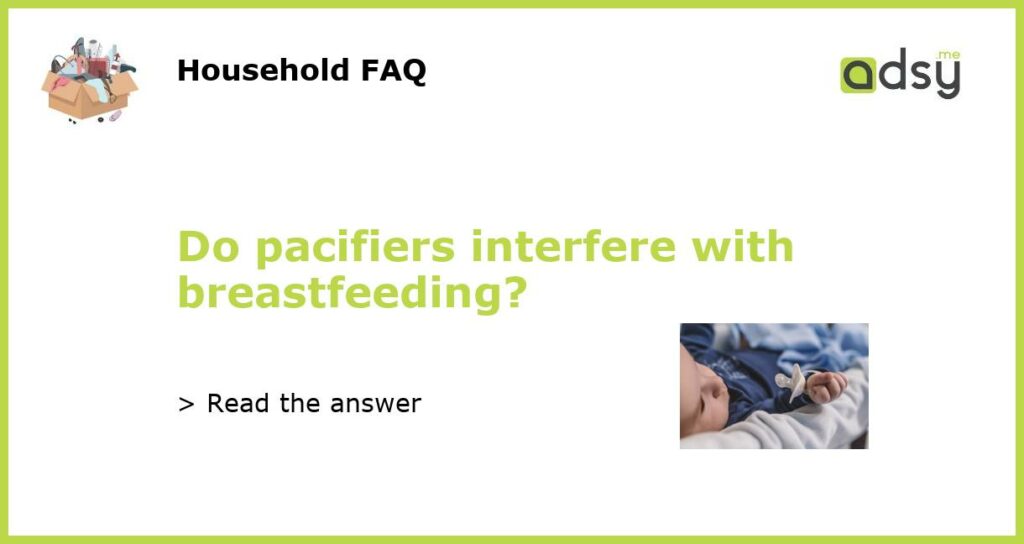The Impact of Pacifiers on Breastfeeding
Pacifiers are a common item parents use to soothe their babies. They provide comfort and can be a useful tool to help calm a fussy infant. However, there has been some debate surrounding the use of pacifiers and whether they can interfere with breastfeeding. In this article, we will explore the potential effects of pacifiers on breastfeeding and provide some recommendations for parents.
Nipple Confusion and Reduced Milk Supply
One concern often raised about pacifiers is the potential for nipple confusion. Nipple confusion occurs when a baby has difficulty switching between the breast and an artificial nipple, such as those found on pacifiers or bottles. The concern is that if a baby becomes familiar with the feel of an artificial nipple, they may have difficulty latching onto the breast and feeding effectively.
Additionally, the use of pacifiers has been linked to a potential decrease in milk supply. This is because the baby may spend less time at the breast if they are using a pacifier for comfort. Breastfeeding works on a supply and demand basis, meaning that the more frequently a baby feeds, the more milk the mother produces. If the baby is consistently using a pacifier instead of feeding at the breast, it can lead to a decrease in milk supply.
Pacifiers and Extended Nighttime Feedings
Another potential concern with pacifier use is how it may impact nighttime feedings. Babies frequently wake during the night to feed, and this is natural and expected. However, if a baby is given a pacifier instead of being allowed to nurse at the breast, it can disrupt their natural feeding patterns. This may lead to less frequent nighttime feedings, which can impact the amount of milk the baby is receiving and potentially decrease milk supply.
Additionally, pacifiers can interfere with the parent’s ability to identify hunger cues. When a baby is at the breast, the parent can directly observe their feeding patterns and monitor their hunger level. This can be more difficult if the baby is using a pacifier as a substitute for feeding. The parent may not be able to accurately assess if the baby is hungry or if they are using the pacifier for comfort.
Managing Pacifier Use for Breastfeeding Success
While there are potential concerns surrounding pacifier use and breastfeeding, it is important to note that not all babies will experience these issues. Some babies are able to use pacifiers without any negative impact on breastfeeding. However, if you are concerned about the effects of pacifiers on breastfeeding, there are some strategies you can try:
– Delay introducing a pacifier until breastfeeding is well-established. This gives your baby time to develop a strong latch and feeding routine at the breast before introducing an artificial nipple.
– Limit pacifier use to specific times, such as during naps or when the baby is fussy. By using the pacifier strategically, you can still provide comfort to your baby while minimizing the potential impact on breastfeeding.
– Ensure that breastfeeding sessions are the priority. Offer the breast frequently and allow the baby to nurse to their satisfaction before offering a pacifier. This will help ensure that the baby is getting enough milk and that your milk supply is maintained.
Consult with a Lactation Consultant
If you are struggling with breastfeeding or have concerns about pacifier use, it can be helpful to consult with a lactation consultant. A lactation consultant can provide personalized support and guidance, helping you navigate any challenges you may be facing. They can observe your baby’s latch and feeding technique to determine if nipple confusion is present and offer recommendations tailored to your specific situation.
In conclusion, pacifiers can potentially interfere with breastfeeding by causing nipple confusion, reducing milk supply, and disrupting nighttime feedings. However, not all babies will experience these issues. By being mindful of pacifier use and implementing strategies to manage its impact, parents can support breastfeeding while still providing comfort to their baby. If you have concerns or need additional support, don’t hesitate to reach out to a lactation consultant for guidance.






